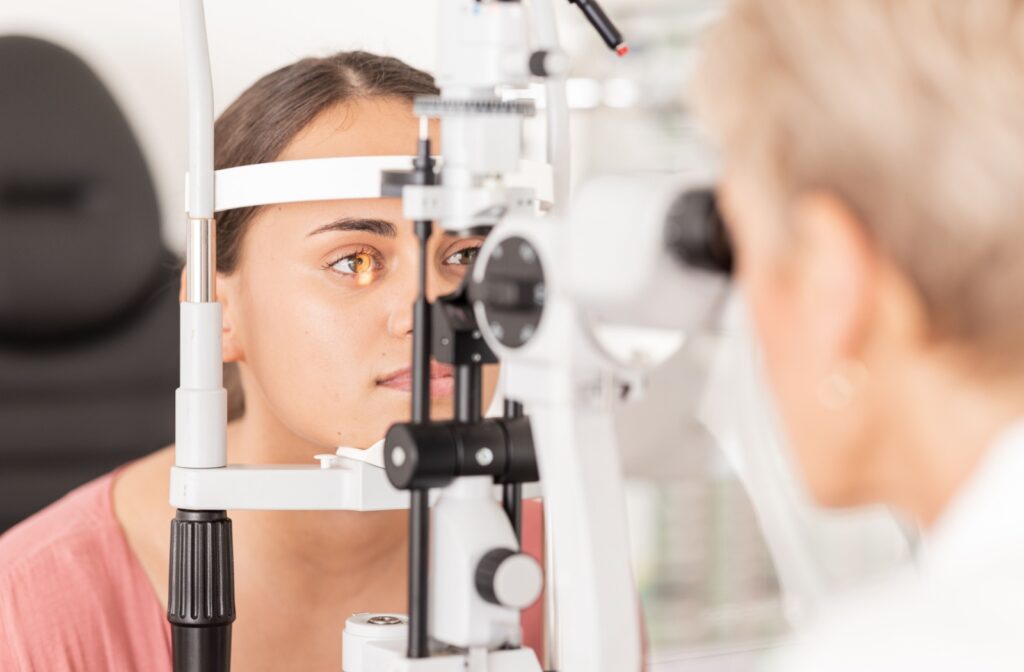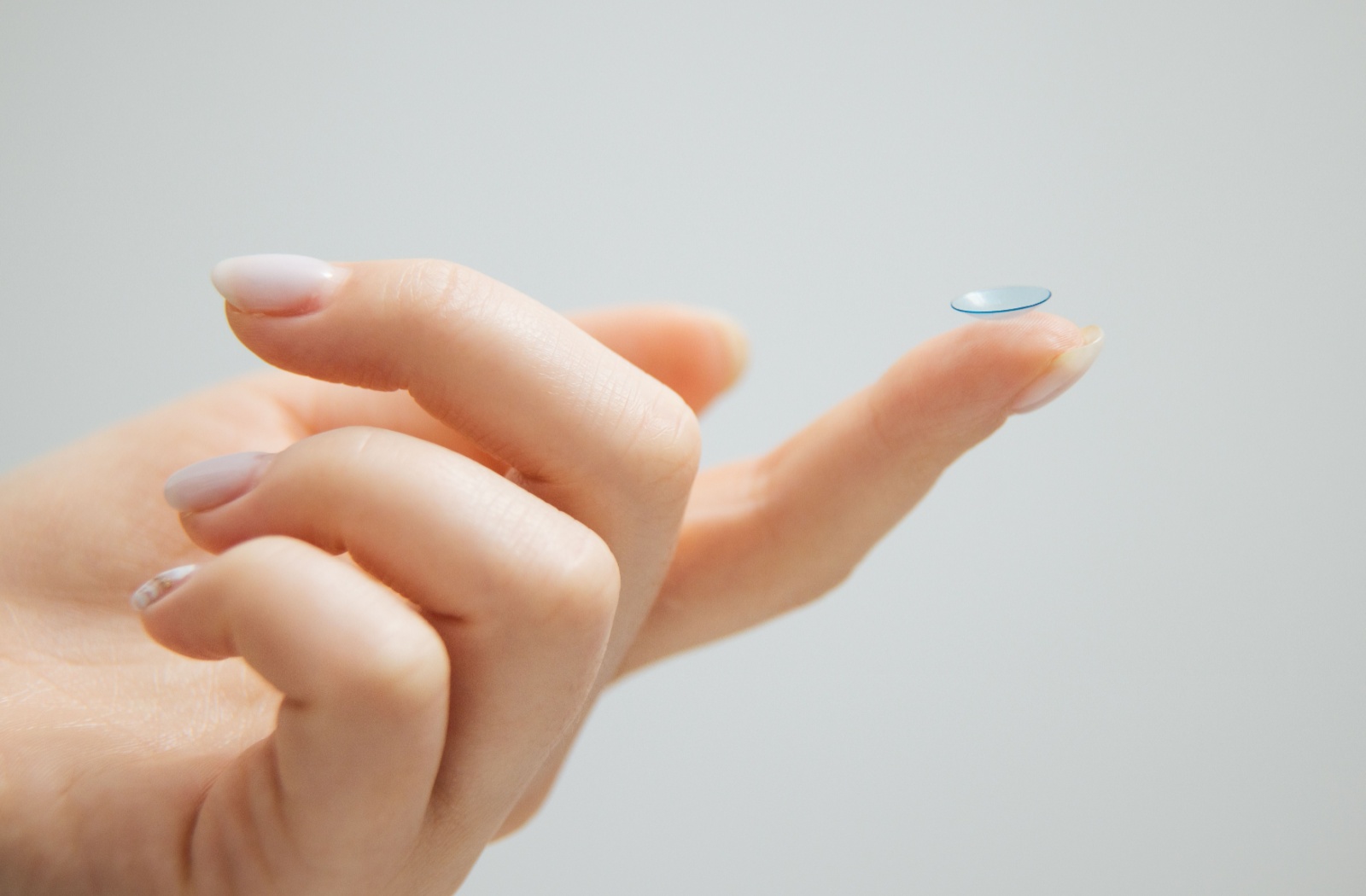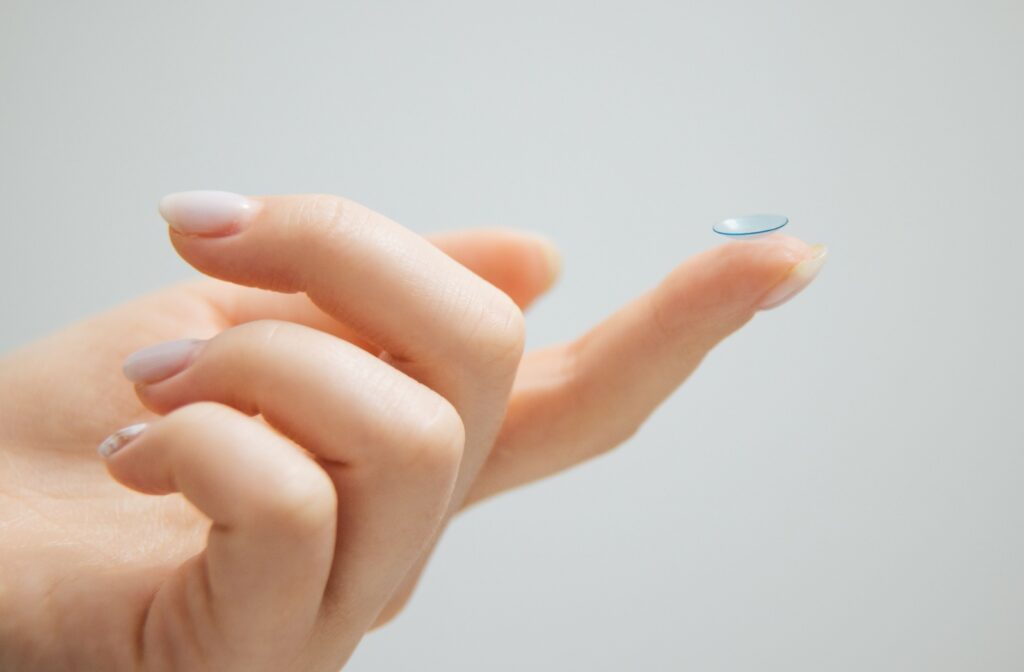If you wear contact lenses, you may be wondering: Should I wear my contacts to my next eye exam? It’s a great question—and the answer depends on the type of appointment you’re scheduled for.
For a comprehensive eye exam, it’s recommended that you remove your contact lenses at least two hours before your appointment, but for a contact lens exam, you should wear your contacts so your optometrist can assess their fit and function.
The Two Main Types of Eye Exams
Before we get into whether you should wear contacts to your appointment, it’s important to understand the difference between comprehensive eye exams and contact lens exams. While both exams help evaluate your eye health and vision, they serve different purposes, and your preparation for each one may vary.
What Is a Comprehensive Eye Exam?
A comprehensive eye exam is a full check-up for your eyes. It evaluates your vision, screens for common eye conditions (like glaucoma and cataracts), and checks the overall health of your eyes. These exams often include:
- Visual acuity testing
- Refraction tests to determine your prescription
- Eye pressure measurements
- A thorough examination of the retina, optic nerve, and cornea
These tests help your optometrist diagnose vision problems and catch early signs of eye diseases or even systemic health issues like diabetes and high blood pressure.
What Is a Contact Lens Exam?
A contact lens exam is more specialized. It includes everything a comprehensive exam does, but goes further by evaluating how your contact lenses interact with your eyes. Your eye doctor will:
- Measure the curvature of your cornea
- Assess the fit and movement of your lenses
- Evaluate your vision while you’re wearing contacts
- Determine whether your lenses are still the right type and size
This exam is essential for current contact lens wearers or those interested in trying them for the first time.
Should You Wear Contacts to Your Eye Exam?
Here’s where things get specific. Whether or not you should wear your contacts depends entirely on the type of exam you’re having.
For a Comprehensive Eye Exam?
No, you should not wear your contacts. It’s recommended that you remove your lenses at least two hours before your appointment—and in some cases, even longer. Here’s why:
1. Accurate Measurements
Contact lenses slightly alter the shape of your cornea. This can affect test results, particularly the refraction test that determines your glasses or contact lens prescription. Removing your lenses ahead of time allows your eyes to return to their natural shape for more accurate results.
2. Better Eye Health Assessment
Wearing contacts during an exam can make it harder for your eye doctor to fully assess the health of your eyes. Your optometrist needs a clear view of the cornea and other internal eye structures to detect early signs of eye diseases like macular degeneration, diabetic retinopathy, or dry eye syndrome.
3. Reduced Risk of Irritation
If your eyes are irritated or dry, wearing contacts can make things worse. Removing them gives your optometrist a better look at your natural eye condition without interference.
Bottom line: For a comprehensive exam, go contact-free.
For a Contact Lens Exam?
Yes, you should wear your contacts. If the purpose of your visit is specifically to evaluate your current contact lenses or fit new ones, your optometrist will need to see how the lenses perform while you’re wearing them.
Your eye doctor will:
- Observe how the lenses sit on your eyes
- Ask about comfort and dryness
- Make a note of any movement or vision issues
Wearing your lenses to this type of exam helps your optometrist decide if your prescription needs adjusting or if you might benefit from switching to a different type of lens.

Frequently Asked Questions
Can I Wear Glasses to My Eye Exam?
Yes! Wearing glasses to your eye exam is totally fine—and even helpful. You’ll likely be asked to remove them during some tests, but bringing your current glasses helps your optometrist compare past and current prescriptions.
What If I Forgot to Remove My Contacts?
If you show up to a comprehensive exam with your contacts in, don’t worry—it happens! Just let your eye doctor know, and they may ask you to remove them at the start of the appointment. However, keep in mind that this may affect certain test results or delay your exam slightly.
What If My Eyes Are Irritated or Red?
If you’re dealing with irritation, discomfort, or signs of an eye infection, you should avoid wearing contacts entirely until you’ve seen your optometrist. Wearing lenses under these conditions can worsen the issue and delay healing.
How Long Should I Leave My Contacts Out Before an Exam?
For a comprehensive eye exam, aim to leave your contacts out for at least two hours, or follow your optometrist’s specific instructions. Some people—especially long-term wearers of rigid gas-permeable (RGP) lenses—may need to stop wearing them for a few days ahead of the exam for the most accurate results.
How to Prepare for Your Eye Exam & Get the Best Results
Knowing whether to wear your contacts to your eye exam depends on the purpose of your visit. If it’s a routine comprehensive exam, take them out a couple of hours beforehand. If you’re getting a contact lens fitting or check-up, wear them in.
Understanding this small but important difference can make your appointment go more smoothly—and help your eye doctor give you the most accurate prescription and best possible care. Ready to schedule your next eye exam? Envision Eye Care in Aurora, CO is here to help with personalized, professional vision care—whether you wear contacts, glasses, or both.
Book your eye exam today and see the difference expert care can make!



